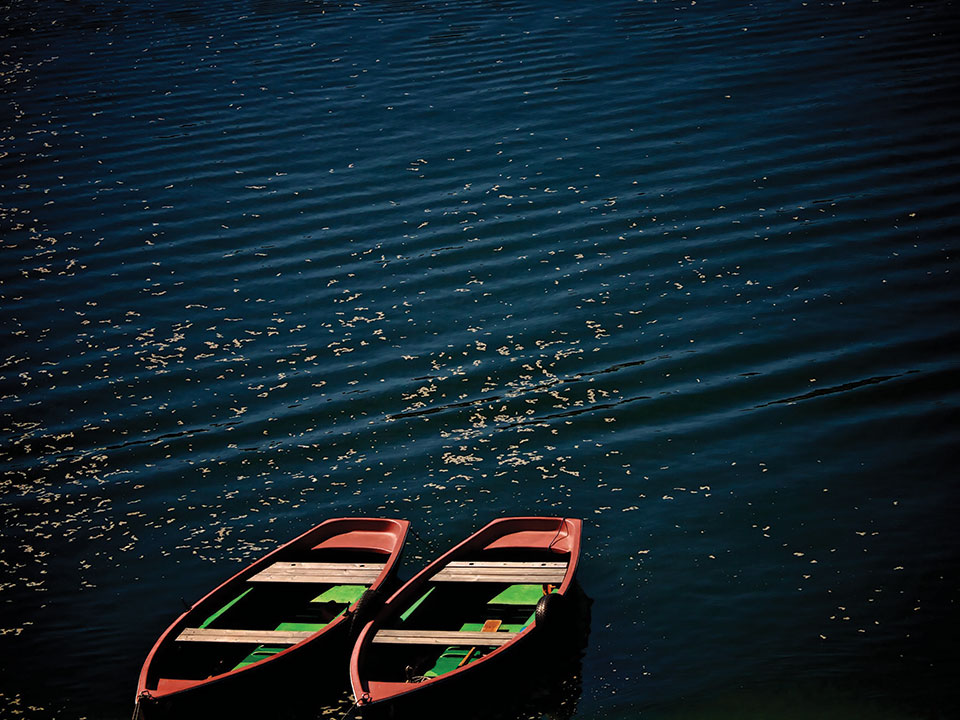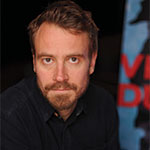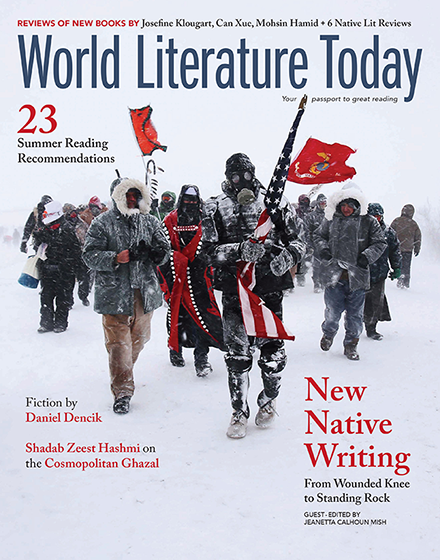Labrador

A relationship is put to the test when a young couple visits a family member on an isolated island.
We left home to think it over. Nanna had an abortion three years ago, so this time we wanted to be sure we were making the right decision. When I was younger, I had this idea that the right choice in life would always reveal itself—that you would know, with certainty, what was right and what was wrong in any given situation. You could still make mistakes, but you’d know that there had been a right choice you didn’t make.
“Now what?”
Small wrinkles formed on Nanna’s forehead. We were leaning against the ferry’s railing and watching the cars drive on board.
“Is there no such thing as right and wrong anymore?”
“Yes, but we just can’t see it. We don’t know what the right choice is until we make it. That way, the choice becomes the right one because it’s the one we made. It’s funny how that works. After we’ve removed all the other options, a choice becomes the right one simply by being made.”
She took off her parka and wrapped it around her waist.
“Oskar . . . what’s the real reason you don’t want to have a baby with me?”
“I never said that. That’s not what I’m saying.”
“You’ve already made up your mind.”
“No I haven’t at all.”
“I wish you’d at least try to imagine what it would be like if we kept the baby and you became a dad.”
“Is this why we’re going out to see Nathan?”
“You need to meet each other, sooner or later.”
As the ferry cast off, I put my arm around Nanna. A fresh wind blew out on the ocean, and small clouds drifted beneath the sun. It was just before Easter. As the clouds began to block the sun, the warmth left the air. We decided to go back in and get some hot chocolate at the cafeteria.
If you’re going to introduce someone to your family, you better be sure.
Nanna sometimes spoke about Nathan, but for some reason I’d never met him. For one thing, he lived out on the island all year long, but I think it had more to do with the confusion there’d been between Nanna and me. We’d always put off any proper introduction to each other’s parents, because we had enough problems of our own without complicating matters even further. If you’re going to introduce someone to your family, you better be sure. I’d gotten a pretty clear picture of him through Nanna, anyway. Let’s just say he wasn’t someone I was looking forward to meeting.
The cafeteria was dead; we bought a packet of biscuits and two cups of hot chocolate and sat down by a window.
“How did he end up way out here?”
“So he can concentrate. No interruptions.”
“But didn’t he and your mother ever live together?”
“He’s always been a bit of a lone wolf. When they had me, it was probably too much for him.”
“And before that—didn’t they live together?”
“As far as I know.”
“Well, there you go.”
“We might as well just go back home.”
“What?”
“You obviously don’t want this baby.”
“I just want us to be happy together—not have a baby and then split up.”
“We can still be happy with a child.”
We were the only passengers who got off on the island. Watching the boat sail off without us, I got the feeling that we never should have come out here. No one came to meet us. Newspapers from last summer were still hanging in a shuttered kiosk. Nanna said it was about three kilometers to the house, so we started walking. There wasn’t much else to do. I thought someone would have come to get us, but I wasn’t going to bring it up now. We followed a path up a steep slope that had bushes on either side. As we approached the top, the bushes disappeared, the landscape became flat and barren, and the headwind tore at our clothes. I didn’t see a single house. We walked across the island, which took an hour, so it must have been longer than three kilometers. We didn’t see anyone or anything. I couldn’t understand why anyone would want to live out here.
Finally we reached a beach again. We continued into the wind, down the hillside. Strung along the coast were five weather-beaten bunkers, low barracks-like buildings made of reinforced concrete. Sand lay in drifts against their outer walls. All the island’s inhabitants lived here, but they were summer residents. Until May, Nathan had the island all to himself. As we got closer, a dog barked from inside one of the houses.
“Do you think he isn’t home?”
“The flag is up—that means he’s here.”
I caught sight of the flagpole next to the one house. At the top flapped a sun-bleached piece of fabric, and there was an aluminum dinghy on the beach. A dog, black and frisky, stormed out of the house and stopped a few meters away, barking loudly. It just stood there, barking at us with everything it had.
“Elvira!” A voice yelled from inside the house.
Immediately after, Nathan emerged with a leash in his hand.
I recognized him from Nanna’s photographs.
“Elvira!”
He walked over, lifted the leash, and smacked the dog on the back with it—hard. It stopped barking. Grabbing the dog by the scruff of the neck, he dragged it over to the flagpole where he tied it up. His jeans were tucked into a pair of boots, and he had on a sweater with a leather vest over it.
“She’s not used to visitors.”
He held out his hand. His fingers were flecked with paint. Nanna jumped in between us.
“Oskar, this is my father. And Dad, this is my boyfriend, Oskar.”
“I can see that,” said Nathan.
Nanna kissed him on the lips. We stood there in the gusty wind and sunshine staring at each other.
“Let me show you where you’ll be staying.”
He led us across the beach to one of the other houses. The concrete barracks were all identical, with iron doors, tin roofs, and shuttered windows. Nathan stopped in front of a door and fumbled with a bunch of keys. He turned two different locks and shoved open the door. Plaster sifted down. Inside it was dark and stuffy.
“You have it all to yourselves. They don’t mind, as long as you clean up after yourselves.”
“Super,” said Nanna.
Nathan hit a switch and an energy-saving bulb lit up in the ceiling. He took a key off the chain and placed it on the table by the entrance.
“You won’t need to lock up. No one’s coming here.”
He left. I took off my backpack. The lamp emitted a weak, dim light; the air tasted like chalk. Nanna ran a finger across the tabletop, her fingertip turning white. She looked up at me.
“What a place,” she said.
I walked over and opened the switched-off refrigerator.
A sticky tube of mustard and a few rolls of film.
“It feels as if someone has died,” I said.
“We don’t have to spend much time in here.”
It felt uncomfortable to be in some strangers’ home. They must have been ornithologists or at least really into birds. The only books in the place were encyclopedias about seabirds; binoculars and bird whistles were hanging on the walls. Otherwise the barracks were bare. There were no bed linens or comforters, only a pile of military blankets under the bed. I emptied my backpack onto the mattress—the biscuits were all in pieces. I couldn’t get any coverage on the cell phones. There was a faucet but no toilet.
“What are we going to do about food?”
“We should have brought some with us.”
“Didn’t you know it would be like this here?”
“I’ve only been here in the summer when the kiosk on the harbor is open. You can usually buy fast food at the campground. But everything looks closed now.”
“How does Nathan manage out here?”
“I don’t think my father needs that much. He fishes.”
“Aren’t you hungry? You’re always hungry. We haven’t eaten anything but biscuits. I’m starving.”
“Let’s talk to Dad. We should tell him soon anyways.”
Before going over to Nathan’s, we walked around the house and opened the shutters. From the back, you could see through the bunker, down to the sea. The concrete was massive, yet you could see straight through it. As we approached Nathan’s house, the dog started barking again, but now it was tethered to the flagpole. We knocked on the iron door and walked in. Nathan’s house was more workshop than home. He was wedging open some paint cans with a knife.
From the back, you could see through the bunker, down to the sea. The concrete was massive, yet you could see straight through it.
“You two already tired of your own company?”
“Yes,” said Nanna. “Are we disturbing you?”
“I’d planned on working today.”
I turned to Nanna.
“We can just come back later.”
“You said you were starving.”
Nathan looked up from his paint cans.
“He’s starving, is he?”
“I can wait.”
“For what? Someone to make you some food?”
“No.”
“Then what?”
“Dad, we forgot to bring food with us. It’s my fault.”
“Well, the sea is full of fish. You can take the boat out.”
Nanna gave me a searching look.
“Shall we? It sounds like fun.”
I shrugged, nodded.
“Do you have any fishing rods we can borrow?”
The water was ice cold. I had to take off my shoes so they wouldn’t get wet when I pushed us off. Nanna sat in the bow with her sunglasses on. The fishing gear consisted of some nets, two fishing poles, and a mason jar of worms. Once we could no longer see the seabed, we cast anchor. The dinghy rocked on the waves, and I grabbed the rods. Nanna didn’t mind hooking the worms. We started to fish.
“He’s not big on company, is he?” I said.
“Don’t take him so seriously. I think he’s really happy you’re here. He just doesn’t show it.”
“You can say that again.”
“He is what he is.”
“What do you think he’ll say when you tell him you’re pregnant?”
“I’m trying to imagine it. He’ll probably be touched—he should be. Try picturing him as a grandfather.”
“Maybe we just shouldn’t tell him.”
“What?”
“Maybe it’s too much all at once. He barely knows who I am.”
“Yes he does. I’ve told him a lot about you.”
Something nipped at my hook and disappeared. It happened again, the bobbing at the surface. I held the rod still. When I felt the fish on the line a third time, I pulled up on it. I felt a weight attach itself and I reeled it in. Once the hook reached the surface, I saw the small fish that had bitten on it. I pulled it on board. It landed on the bottom of the boat, where it lay gasping for air.
“Aren’t you going to throw it back in?”
“No, I hadn’t planned on it.
“Throw it back in—look at how small it is.”
“It’s our dinner, Nanna. I’m not throwing it back in.”
“Maybe we’ll catch something bigger.”
“Yes, and then I’ll toss it back in.”
“Then it’ll be too late. Then it’ll be dead.”
“That’s life.”
We didn’t throw it back in, and we didn’t catch anything else. The sun sank in the sky. On the beach, Nathan was in the process of building a bonfire. Finally we packed up the gear and rowed back to shore. The dog was lying by the fire. Nathan squinted at us. Behind him the barracks’ tin roofs reflected the setting sunlight.
“How did it go?”
Nanna held up the fish. He looked at the little fish and then at me, but said nothing. He prepared a mackerel for grilling. The impressive fish was impaled on a branch that had been shoved into the sand near the fire. Once the fire caught, Nathan vanished into the house and fetched two more mackerels. They were frozen fish. He tossed both of them at me. I caught the hard fish in midair.
“There are branches in the woodshed. Nanna knows where.”
While Nanna went to get the branches, I stood with Nathan by the fire. I was still holding the fish. Their frozen surfaces were thawing into slime.
“Why haven’t I seen you before now?”
“Excuse me?”
“How long have you two been together?”
“About four years. It’s been a little off and on. But four years, if you count the breaks too. And you’ve been out here the whole time. But we’ve often talked about visiting you.”
“So why are you here now?”
“What do you mean?”
“Why did you come here? Is she pregnant?”
“Pregnant?”
I had no idea how he already knew that.
“Has Nanna told you?”
He shrugged. Nanna showed up with two branches. We speared the fish through their mouths. Nathan tossed a carton of salt to me. I rubbed the fish, then dried my fingers in the sand. When the flames died down, we started grilling the fish. I felt like I should say something.
“Does it ever get lonely out here?”
Nathan glanced in my direction but didn’t respond.
“Dad loves being alone, right?”
“I’m not lonely. There’s a difference. I have Elvira. Now and then I meet fishermen out at sea. My gallery owner comes to visit. Sometimes I even meet with journalists. It’s damn busy out here.”
“But don’t you ever miss having a normal life?”
“A normal life,” he repeated.
“Yes, a daily routine, some civilization, a little comfort?”
He turned to his daughter and laughed.
“You’ve got yourself a real Curious George here.”
Nanna took my hand and gave it a squeeze.
“Of course I miss the ladies sometimes. But if you must know, I’d say that it’s probably been better for me to sit out here missing house and home than to sit with house and home missing this. It’s caused me less worry If you want to make life easy for yourself, that is. “
He leaned over the fire and checked his fish. Then he got up and walked toward the barracks, the dog following behind him.
“He knows you’re pregnant.”
“Did you tell him?”
“No, he just knew it. I thought maybe you had told him.”
“So what did he say?”
“Nothing. Remember what we talked about. It’s important to me that it’s our choice—not his.”
“We can still ask him what he thinks. He is my father.”
Nathan came out of the house with dog food and a can opener, and the dog dancing around his legs. He opened the can and gave it to the dog. Then he took his mackerel off the fire.
“Eat.”
I gave Nanna one of the branches and took the other. There was no sign of utensils or plates, so we used our fingers. The fish was hot and blackened, but once you got the skin off, the pale meat was edible, thanks to the salt, which at least gave it a little flavor. Stars began to dot the sky. Out on the ocean, distant ships also came into view. Nathan tossed his skin to the dog, and we did the same. It had devoured the can’s contents.
“How long have you had it?” I asked while we sat around the fire.
I don’t know why I’d become so chatty, but I wasn’t used to long periods of silence, especially during meals. I was also worried that we should get on to the pregnancy.
“This little lady?”
Nathan patted the dog on her back.
“Only one winter. She’s still just a puppy. Do you know the breed?”
“I don’t know much about dogs.”
“Rottweiler.” The word flew out of Nanna.
“Rottweiler,” scoffed Nathan.
“I don’t think it’s a Rottweiler,” I said.
“She’s a Labrador Retriever. Best dog ever bred. Now that’s a loyal companion.”
“Why is she so good?” I asked.
“She does what I say, that’s why. If I get tired of her, I can always get rid of her and get a new dog. She never complains, she’s a cheap date, and as long as I keep her on the island and don’t let her meet any other mutts, it’ll just be the two of us.”
Nathan spat between his boots. I heard a seagull screeching somewhere in the dark.
“Yes, you won’t find many women who would put up with that.”
Nanna gave me a strange look.
“Oskar says that you know I’m pregnant.”
“I figured as much, when you two suddenly showed up here. Even Elvira could tell.”
Nanna and I looked at each other.
“But we’re not sure we want to keep the baby,” said Nanna. “Well, really, it’s Oskar who doesn’t know what he wants. I want to.”
“You two have already had one abortion, if I remember correctly.”
“Yes,” I said. “That’s right.”
I tried to be as forthcoming as possible.
“Three years ago,” I continued. “At that point we hardly knew each other. I suppose things are different now. But we’ll figure it out.”
Nathan sat there, silent for a moment. I was hoping the subject was now closed. He stared into the embers and said:
“No relationship can survive two abortions.”
A few sparks flew up from the fire toward the flagpole, where they fizzled out.
“What do you mean?” I asked.
He stopped staring into the fire and started eating again.
“Anyone can make one mistake. But choosing abortion for the second time means you’re not really invested in your own relationship.”
“Interesting,” I said, although it wasn’t particularly interesting.
“Does that mean you think we should keep the baby, Dad?”
“No, sweetheart, it doesn’t. But no relationship can survive two abortions. That’s all I’m saying.”
“But what do you think?” I asked, regretting the question as soon as I said it. I kept looking at the dog, lying there with its eyes closed, growling softly. Nathan tossed his gnawed fish bones onto the embers. Apparently he had no intention of answering my question. The skeleton hissed as it caught fire.
“Thanks for dinner,” he mumbled, to no one in particular.
“What should we do with the little fish?” I said.
“Can we grill it too?” asked Nanna.
“If you plan on eating it. Otherwise give it to Elvira. She can usually eat roaches.”
Nanna looked at me.
“I told you we should have thrown it back.”
We let the fish lay there in the sand. It irritated me that Nathan had ignored my question. I couldn’t stop myself from trying again.
“On one hand, you claim that no relationship can survive two abortions, but on the other you don’t seem to think we should keep the baby. So, we can just put two and two together and conclude that you want your daughter and me to break up.”
“You can conclude whatever you want.”
“But by your reasoning, we shouldn’t invest in our relationship.”
“No. You’re the one sitting here putting two and two together.
Nanna stood up.
“I’m going to hop in and fix some dessert. We did manage to bring some biscuits with us.”
I watched her walk toward the houses and disappear into the night.
“It’s better if you just say it like it is, Nathan. You don’t think we should have children. That’s fine. You don’t think your daughter should be with me.”
“Those are your words, not mine.”
“Then say what you mean.”
“Don’t sit there telling me what I should or shouldn’t do.”
“Right, okay. Cause I’m just a big zero in your eyes, right?”
“Just shut up.”
Nanna came back with what was left of the biscuits.
“Good night,” I said, standing up. “I think I’m going to bed.”
“It’s so early. Can’t you stay by the fire a little longer?”
“No thanks. But you stay here with your father.”
The low-energy lightbulb in the ceiling buzzed when I turned it on. A crane fly took off, heading for the light. I shooed the insect outside and closed the door. The tap water was brown. I wasn’t sure it was safe to drink, so I brushed my teeth without water. I filled the backpack with our things, placed it beneath my neck, and pulled the military blanket up over me.
I lay on my side, facing the wall, the backpack under my head. I knew I couldn’t fall asleep, but when Nanna came back, it felt as if she were waking me up. I had no sense of how much time had passed.
“Are you sleeping?”
“No, I was awake. Have you two been talking until now?”
“I did most of the talking. You know how Dad is.”
“He doesn’t think we should keep the baby, does he?”
“Hard to say. But you’re right. He doesn’t seem too excited about it.”
Nanna undressed down to her panties. Then she plopped down by my side in the dark and crawled in under the blanket.
“You have your coat on,” she exclaimed.
“The bed didn’t feel clean. We don’t know who’s been sleeping in it. And you should be careful too. Now that you’re pregnant and everything. You could get an infection.”
“Now you’re worried about it? Calm down. Take things as they come.”
“Is that your father talking?”
“No, it’s me. Why are you so obsessed with what he has to say?”
“Because it seems like he really can’t stand me.”
“Stop. He thinks you don’t like him.”
“That’s just ridiculous.”
“I’m not so sure. You haven’t said a nice word about him.”
“I don’t know him. I only know that he doesn’t think we should have children together.”
“And neither do you.”
“I just don’t want to lose you. If you want to keep it, then so do I.”
“Oh.”
“Is that all you have to say?”
“What do you want me to say?”
“I just thought you’d be happy.”
“I don’t know what I should say.”
“Has your father convinced you to have an abortion now?”
“No. But as indecisive as the two of us are we should probably wait anyway.”
“So he has convinced you.”
“Go to sleep. We can talk about it tomorrow.”
She turned her back toward me.
I lay there staring up into the darkness for a long time.
“Nanna?”
“What now?” she muttered.
“What he said about no couple surviving two abortions—do you also believe that?”
“In a way.”
“So then that means it’s over between us?”
“What?”
“It means it’s over now.”
“I heard you the first time. I don’t know. Can’t we just go to sleep?”
“Sleep? When you’ve just broken up with me?”
“I haven’t broken up with you.”
“Then I don’t understand anything.”
I kicked off the blanket, turned on the light, and stood up.
“What is the problem between you and your father?”
Nanna sat up and covered her breasts with the blanket.
“Nothing.”
I looked at the backpack lying behind Nanna.
“I can’t stay here any longer.”
“No,” she said. “But the next ferry isn’t until the day after tomorrow.”
“We have to wait two more days?”
A lock of hair had fallen over her eyes.
She brushed it away.
“Dad can give you a lift, as soon as the sun comes up. He can add a motor to the dinghy.”
Translation from the Danish
By Mark Mussari












